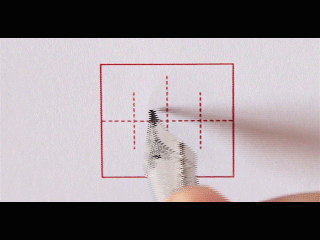In the past, calligraphy was regarded as a person's "second face", and being able to write well was a asset worthy of showing off. As the saying goes, "words are like the person they are." However, as computers and the Internet increasingly penetrate into daily work and life, computers have gradually replaced pens in many aspects, with more and more "typing" and less and less writing.

In the Internet age, does traditional calligraphy still have any significance? Is it still necessary for students to practice calligraphy? To this end, the reporter conducted a special interview.
1. Words that cannot be used are burdens
"This mid-term exam was because the child's handwriting was sloppy, which directly affected his test scores." Ms. Zhang told reporters that her child was in the third grade of Taihang Primary School. Recently, the school held a mid-term exam, and the child's handwriting was sloppy because of Wai Wai Nai Nui can't be seen, the ideological and moral character only scored 73 points, and the ranking dropped from 4th to 10th last time. Ms. Zhang said that her child lay in front of the computer all day long and asked him to practice calligraphy more, but he said that we are in the digital age and he only needs to be able to type.
During the interview, the reporter found that most students thought their handwriting was ugly and difficult to use, but they were unwilling to "practice calligraphy." When talking about the reasons for "not wanting to practice calligraphy", their answers were "can use a computer instead", "don't have time to practice calligraphy", "it doesn't matter if the handwriting is good or not". In real life, does it really matter whether your handwriting is good or not?
Illegitimate handwriting and too many typos have become common problems among many primary and secondary school students. Teacher Zhang from Wuxiang No. 2 Middle School told reporters that students' handwriting is getting worse and worse, and their writing habits are bad, and some words are difficult to read. Especially when the teacher is marking the composition, the emotional score is very obvious due to the handwriting. Under the same writing level, the score of the composition with beautiful and generous fonts will be about one or two points higher.
2. Parents do not pay attention and it is difficult for teachers to correct them.
"Participating in art, music and other art training will be beneficial to children's future studies." Ms. Huang signed up for an art training class for her child who has just entered the second grade of primary school, but did not choose a calligraphy training class. She hopes that her children will pass the art training examination and become students with special talents in art, so as to prepare for admission to key art universities in the future. Ms. Huang believes that nowadays, some universities have certain admission quotas for students with specialties in art, music and other arts, but there are almost no admission quotas for students with specialties in calligraphy, which has become one of the important factors why some parents are unwilling to help their children choose calligraphy training. .
"It doesn't matter whether your handwriting is good or bad, I'll be typing on a computer anyway!" "Schools spend so much time practicing handwriting, they might as well teach a few more Mathematical Olympiad questions." During the interview, the reporter learned that many parents do not attach great importance to cultivating their children. Good writing habits.
"Some parents teach writing at home and give their children a red book to draw on their own, ignoring correct posture and stroke order guidance." Teacher An from Taihang Primary School said that writing is important for cultivating children's good character. Crucial. If you haven’t been serious about writing since childhood, you may not be serious about doing things in the future. Therefore, parents should pay enough attention to cultivate good writing habits in their children. "Once bad habits are formed, it is difficult to correct them." Teacher An said that if children have just entered school, if they do not master good writing habits and develop irregular writing and improper attitudes, they will have illegible handwriting and misspelled words. Increase, thereby affecting academic performance and even affecting the development of good character in the future. This is a common phenomenon among children.
3. Treat calligraphy practice as a kind of fun
Practicing calligraphy is of great benefit to cultivating students' good moral conduct, enhancing their memory, and improving their quality and temperament. Teacher Cui, who has been teaching Chinese at Wuxiang No. 1 Middle School for 20 years, said that the unique frame structure of Chinese characters allows students to greatly improve their observation, perseverance, and endurance in the process of practicing calligraphy. These improvements are beneficial to learning mathematics, chemistry, and Physics and other cultural courses are very helpful.
Calligraphy training is mainly hands-on, especially training the movements of fingers, wrists and arms to improve coordination and flexibility. These movements are directed by the brain, and regular training is very beneficial to promoting the growth and development of the brain. Children are at the peak of growth and development, and their brain development is basically close to that of adults by the age of 12. Before that, it is very necessary to seize the golden period of brain development to practice calligraphy to promote the growth and development of the brain, develop intelligence, and cultivate talents with high IQ.
Before practicing calligraphy, or during the practice, parents and teachers should not instill or convey to students the boring emotion of calligraphy practice, but should convey to children the message that writing is joyful. Practicing calligraphy requires a process, and improvement is gradual. Parents and students should not rush it, but regard practicing calligraphy as a kind of fun and leisure. Practice slowly and continuously improve in happiness and leisure.








